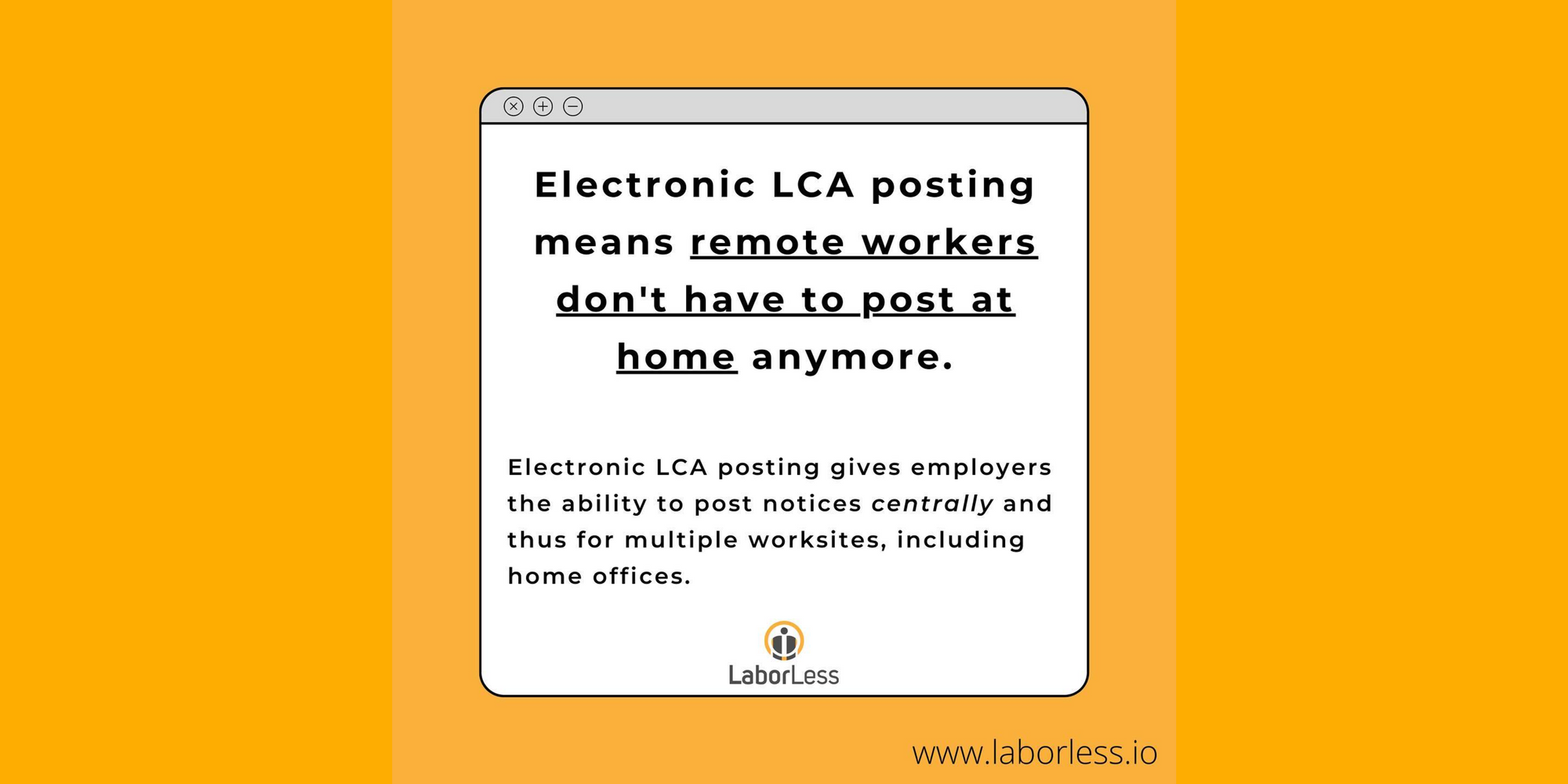In the world of immigration compliance, it’s not uncommon for well-meaning regulations to sometimes result in confusing or downright awkward situations—especially for employees working on H-1B visas. Imagine being an H-1B worker and receiving a request from your employer: "Can you please print out this Labor Condition Application (LCA) notice and post it somewhere in your home?" The initial reaction for many might be confusion, disbelief, or even humor. After all, who would ever see that notice? Your children? Your pets? It doesn’t make much sense, does it?
But while this scenario might seem bizarre, it's a reality for many remote H-1B workers. However, it doesn’t have to be this way. The outdated practice of posting LCA notices physically can be replaced by more modern, electronic LCA posting solutions that simplify the process for both employees and employers.
The Common Scenario: Why Are Employees Posting LCA Notices at Home?
At first glance, the idea of asking an H-1B worker to post a legal document in their private home seems not only unnecessary but somewhat absurd. However, the practice is rooted in immigration law compliance, particularly in how companies must inform employees of H-1B worker details. Before diving into the solution, let’s take a closer look at why this happens in the first place.
- A company hires a worker who needs H-1B visa sponsorship to legally work in the United States. This involves going through several regulatory steps, including filing a Labor Condition Application (LCA) with the Department of Labor (DOL).
- As part of the H-1B application process, the company must notify all affected employees at any location where the H-1B worker will perform work. These notifications must provide details about the H-1B worker’s salary, job title, and work location, ensuring that existing employees are informed of how this new hire will fit into the company structure.
- Historically, this LCA notice was physically posted at the actual office where the H-1B worker would show up to work every day. The notice would be pinned to a bulletin board in the office or perhaps a break room where it was visible to all employees. This was a straightforward solution in traditional office environments.
- As remote work became more prevalent, the definition of a "worksite" evolved. Suddenly, an employee’s home became an official worksite, and LCA postings needed to cover these new, non-traditional worksites too. Unfortunately, many employers interpreted this to mean that H-1B workers should post their LCA notices at home—leading to the surreal request that they print out a legal document and post it on their fridge or front door.
- The final part of this process is where confusion arises. H-1B workers are asked to print the LCA notice and post it at their home, which often leads to bewildered responses. After all, no one else is going to see the notice except their family members—or perhaps their cat. Not only does this feel impractical, but it also puts the burden of compliance on the employee, which isn’t ideal for ensuring Department of Labor (DOL) regulations are met.
While this may sound ridiculous, this outdated process is still the norm in many companies. However, there’s good news: it doesn’t have to be this way.
What Does the Law Say about Electronic LCA Posting? Understanding LCA Posting Regulations
To understand why companies are required to post these notices, it’s important to review the regulations outlined in 20 CFR § 655.734. According to these regulations, companies hiring H-1B workers must provide notice of the LCA filing to affected employees at all worksites. The purpose of this requirement is to inform workers about the employment conditions of the H-1B employee, ensuring transparency around wages and job roles. You can read the full regulatory language here.
For years, this meant physically posting a paper notice in a visible location at the worksite, such as a break room or a common area in the office. But as the workplace evolved and more employees began working remotely, homes became recognized as official worksites, leading to the rather unusual situation of employees being asked to post notices in their own homes.
However, electronic posting is not only a viable alternative—it’s also allowed under these regulations. The law provides flexibility for employers, allowing them to post LCA notices electronically, as long as the posting is accessible to all affected workers. This can be done through the company's internal website, an intranet, or any other platform that employees regularly use.
Electronic posting eliminates the need for physical notices at worksites, including remote worksites, and it ensures broader compliance with DOL regulations without burdening the employee.
The Solution: Electronic LCA Posting
Instead of asking employees to post LCA notices at home, companies can simply post them electronically! Here’s why electronic LCA posting is the game-changer:
Consolidated Posting
Companies can post LCA notices in one central, electronic location (like an LCA "bulletin board") and cover multiple worksites, including employees’ homes.
No More Paperwork for Employees
H-1B candidates and employees no longer need to worry about printing paperwork and sticking it on their fridge for no one to see.
Ensures Compliance
Electronic posting removes the responsibility from employees to ensure that the company is complying with Department of Labor regulations.
Streamlines Processes
Electronic LCA posting helps companies and immigration law firms move away from outdated, manual processes and embrace a more efficient, paperless system.
Why LaborLess is the Perfect Solution
LaborLess is the solution to this exact problem. We specialize in digitizing and automating your manual, paper-based LCA compliance process. Plus, you can keep using your existing case management systems and documentation workflows. We don't replace them—we complement them.
If your law firm supports H-1B employers, or company hires H-1B workers, and you’re ready to make LCA compliance easy and efficient, visit LaborLess today to get started with the best electronic LCA posting and PAF management platform on the market!

